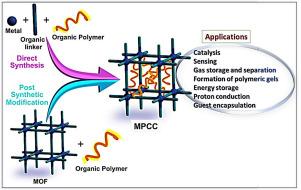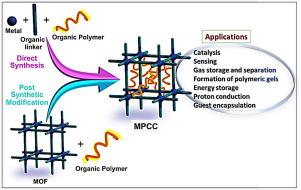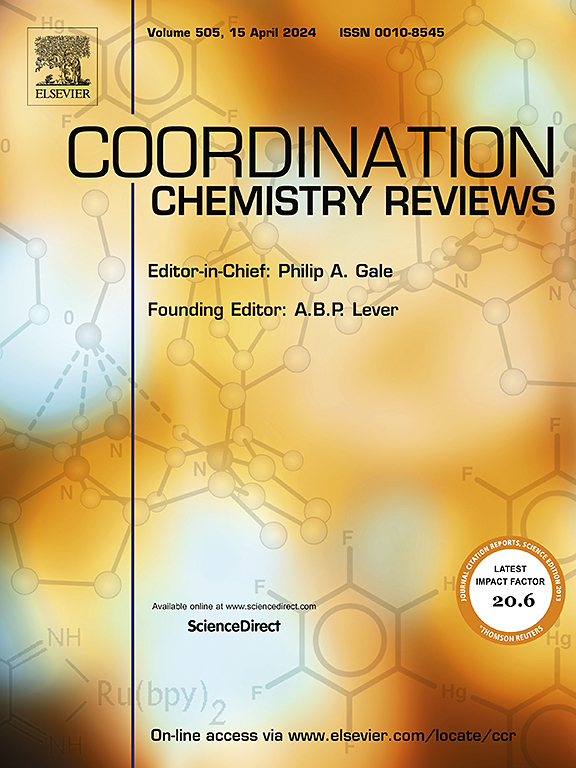Metal-polymer-coordinated complexes: An expedient class of hybrid functional materials
IF 20.3
1区 化学
Q1 CHEMISTRY, INORGANIC & NUCLEAR
引用次数: 0
Abstract
Innovation in materials, aided by recent advancements in science and technology, is shaping a better future. Among these, porous materials, including covalent-organic frameworks (COFs), metal-organic frameworks (MOFs), organic polymers, zeolites, silica, and metal-polymer-coordination complexes (MPCCs), have garnered significant attention due to their rigid structure and higher stability with respect to humid conditions. MPCCs have been of particular interest lately. This review first compares MPCCs to MOFs and COFs, then focuses on their synthesis and properties. It also highlights the unique characteristics that distinguish MPCCs from MOFs and organic polymers. Subsequently, it discusses the use of MPCCs in generating polymeric gels and other applications such as catalysis, sensing, and adsorption/separation of organic molecules and gases. Finally, it delves into the challenges and prospects for their design, synthesis, characterization, properties, and applications. This review aims to guide researchers in exploring the potential of porous materials in various fields.


金属聚合物配位复合物:一类便捷的混合功能材料
最近的科技进步带来的材料创新正在塑造一个更加美好的未来。其中,多孔材料,包括共价有机框架(COFs)、金属有机框架(MOFs)、有机聚合物、沸石、二氧化硅和金属聚合物配位复合物(MPCCs),因其刚性结构和在潮湿条件下的较高稳定性而备受关注。近来,MPCC 尤其受到关注。本综述首先将 MPCC 与 MOFs 和 COFs 进行了比较,然后重点介绍了它们的合成和特性。文章还强调了多孔碳酸钙区别于 MOFs 和有机聚合物的独特特性。随后,报告讨论了多孔碳酸钙在生成聚合物凝胶以及催化、传感、吸附/分离有机分子和气体等其他应用方面的用途。最后,本综述深入探讨了 MPCC 在设计、合成、表征、特性和应用方面面临的挑战和前景。本综述旨在指导研究人员探索多孔材料在各个领域的潜力。
本文章由计算机程序翻译,如有差异,请以英文原文为准。
求助全文
约1分钟内获得全文
求助全文
来源期刊

Coordination Chemistry Reviews
化学-无机化学与核化学
CiteScore
34.30
自引率
5.30%
发文量
457
审稿时长
54 days
期刊介绍:
Coordination Chemistry Reviews offers rapid publication of review articles on current and significant topics in coordination chemistry, encompassing organometallic, supramolecular, theoretical, and bioinorganic chemistry. It also covers catalysis, materials chemistry, and metal-organic frameworks from a coordination chemistry perspective. Reviews summarize recent developments or discuss specific techniques, welcoming contributions from both established and emerging researchers.
The journal releases special issues on timely subjects, including those featuring contributions from specific regions or conferences. Occasional full-length book articles are also featured. Additionally, special volumes cover annual reviews of main group chemistry, transition metal group chemistry, and organometallic chemistry. These comprehensive reviews are vital resources for those engaged in coordination chemistry, further establishing Coordination Chemistry Reviews as a hub for insightful surveys in inorganic and physical inorganic chemistry.
 求助内容:
求助内容: 应助结果提醒方式:
应助结果提醒方式:


